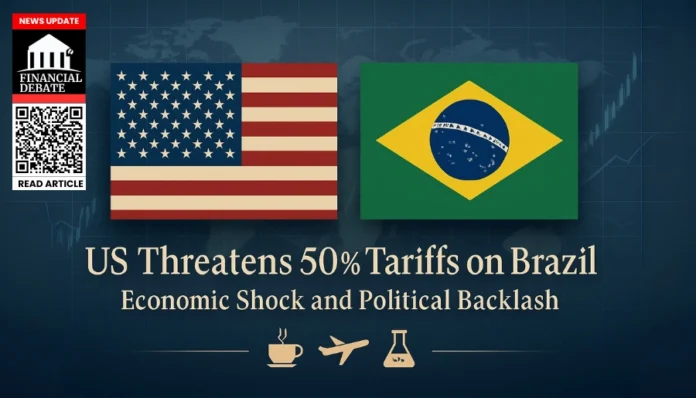- Trump has announced 50% tariffs on Brazilian exports starting August 1, tied to Brazil’s politics.
- Key sectors like coffee, orange juice, chemicals, steel, and aerospace face disruption and lost contracts.
- Brazil is pushing back with diplomatic, legal and trade diversification strategies.
Trump’s Tariffs Push Brazil Toward Trade Shift
President Trump has declared he will impose a 50 percent tariff on Brazilian goods beginning August 1, 2025. He linked the decision to Brazil’s treatment of former president Jair Bolsonaro. Bolsonaro is facing coup‑plot charges. Trump called the prosecution a political “witch‑hunt.” The announcement has sparked diplomatic uproar and halted business negotiations immediately.
Brazilian officials say the tariffs are politically motivated and violate Brazil’s sovereignty. President Lula vowed that Brazil will not yield to economic blackmail. The government plans to use a new reciprocity law to respond. Minas Gerais and São Paulo officials warn of serious consequences on jobs, farming, and exports.
Economic Fallout and Export Risks
Brazil sells about 12‑15 percent of its exports to the U.S., mostly in coffee, orange juice, pulp, and machinery. Those sectors now face sharp pressure. The American market buys around 30 percent of U.S. coffee, and 60 percent of its orange juice. Tariffs hit Brazil hard.
Analysts expect the tariffs could shave as much as 0.2 to 1.2 percent off Brazil’s GDP. Some polls forecast growth slowing to 2.2 percent in 2025 and 1.7 percent in 2026. Inflation is rising too, possibly reaching over 5 percent in 2025.
Job Losses and Chemical Sector Problems
Brazil’s chemical industry earned $2.4 billion exporting to the U.S. last year. Now orders for resins, compounds, fertilizers, and related products are cancelled. Export financing has been pulled. Producers are predicting mounting losses.
The cancellation extends to other industries reliant on chemicals. Steel, plywood, machinery, oil, and agriculture operations all use these inputs. Exporters of orange juice noted disrupted preservatives contracts. Loss cascades across sectors.
Agriculture, Coffee, Orange Juice
Brazil exports over a billion dollars of green coffee and pulp to the U.S. Coffee futures rose 1.3 percent after the tariff announcement. Orange juice futures climbed 6 percent. Markets reacted swiftly.
Small coffee farms are especially at risk. Producers in Brazil report loss of income. They often depend heavily on U.S. demand. Drought and climate stress threaten yields too. Many farmers fear long‑term farm closures if no relief arrives.
Aerospace and Regional Job Threats
Ín São Paulo state, regional officials predict as many as 120,000 job losses due to weaker exports and production cuts. Agriculture losses may exceed $5.8 billion in revenue. The overall economy could shrink by up to 2.7 percent.
Brazilian aerospace firm Embraer calls the tariffs “almost an embargo.” The company fears it may need layoffs similar to those during COVID‑19. Access to U.S. markets is critical for its regional jet exports.
Brazil’s Response and Diplomacy
Brazil’s finance minister has prepared contingency plans with credit support for up to 10,000 companies hit by the tariffs. Proposals include export financing, emergency credit lines, and legal actions at the WTO.
Diplomatically, Brazil sent proposals in May requesting negotiations. Those went unanswered. High‑level U.S. meetings stalled. U.S. companies like GM and John Deere avoided lobbying Washington. Brazil says dialogue was blocked.
Political Implications and Domestic Pulse
Tariffs boosted Lula’s political standing. Analysts say the confrontation has revived nationalist sentiment. Some business elites even turned to support Lula as he defends Brazil’s judicial independence.
Bolsonaro supporters are also reacting strongly. But the escalation appears to undermine Bolsonaro more than help him. His son’s lobbying in the U.S. is under scrutiny, and public sentiment favors national sovereignty.
Article Link: Russia Cuts Interest Rates as Wartime Economy Slows Down
Strategy Ahead: Diversification and Legal Avenues
Brazil plans to diversify trade away from the U.S. China now accounts for about 28 percent of Brazilian exports. New markets in Asia and Africa are being pursued. Brazil may boost ties with BRICS and Mercosur.
Strategic legal options include using Brazil’s Trade Reciprocity Law. Measures might include tariffs on U.S. goods, controlling digital platforms, or revisiting aerospace agreements. Officials keep these tools ready.
Inflation, Currency, and Market Reaction
Brazil’s currency, the real, fell over 2 percent after the tariff news. Coffee futures rose to nearly $289 per pound. Higher domestic inflation may follow. Retail prices in Brazil could rise too.
Economists expect Brazil’s central bank to keep interest rates high—around 14‑15 percent—through the end of 2025 to contain inflation, even if growth slows. Consumer and business borrowing costs remain steep.
Article Link: Developing Countries Face Unprecedented Debt Repayments to China in 2025 Amid Belt and Road Legacy
Conclusion
President Trump’s planned 50 percent tariff on Brazilian exports starting August 1 has rattled Brazil’s economy. Industries from coffee to aerospace face contract cancellations and lost jobs. Brazil is mounting a strong political and legal counterattack. Markets signal stress but Brazil aims to shift trade, assert sovereignty, and limit fallout. Whether diplomacy succeeds or tensions deepen remains uncertain—but Brazil hopes to emerge more resilient.
